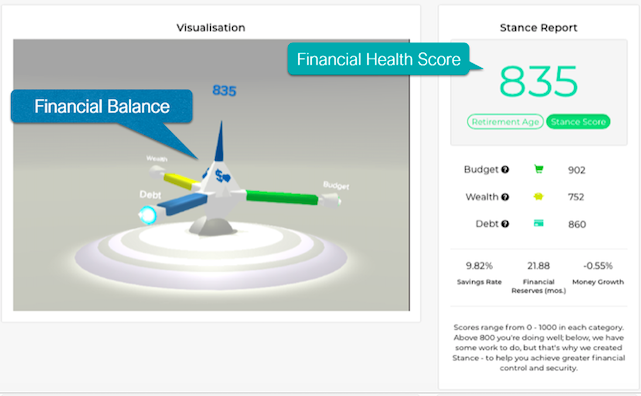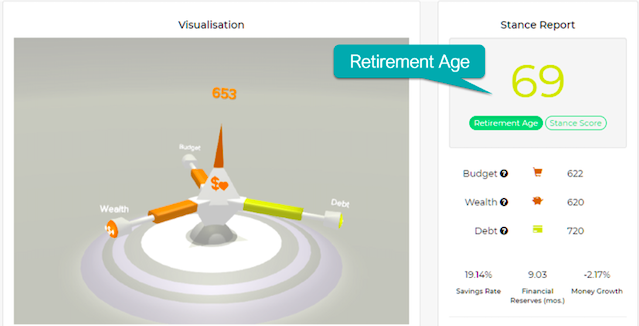By: Ben Haynes, Daymaker Giving
“Food education should be a cornerstone of every child’s education.”
– Erin Croom, founder of Small Bites Adventure Club in Atlanta, Georgia
Daymaker believes that everyone should have access to healthy, wholesome meals, and that humans are happier when they have a connection to their food and its source. It’s also important to acknowledge that there are systems in place that prevent marginalized communities from having access and developing connections to nutritious food.
The Daymaker model is centered around the Receiver’s Journey; a three-year commitment they’ve made to serve their nonprofit partners and the kids in their programming. During the outset of the pandemic, Daymaker asked nonprofits how they could be most helpful, and co-created the ‘Daymaker Discovery Bundle’ – a monthly curiosity box with a theme, physical items like puzzles or board games associated with that theme, and a celebration of diverse heroes in a related field.
Supporting kids monthly in-between back-to-school and Holiday giving campaigns has become a staple of how they hope to serve. As a natural next step in this process (pun intended!), Daymaker is partnering with Small Bites Adventure Club to offer Farm-to-Home Explorer Kits!

Small Bites Adventure Club’s Story
Small Bites was founded in 2018 by a group of women seeking to bring more fruits & vegetables to kids. During the early days, founder Erin Croom was packing “Taste Test Boxes” on her dining room table to create a prototype. The first boxes contained ingredients, a recipe, and a paired activity. Erin remembers being uncertain and having questions: ‘Would teachers find it intuitive to teach the lesson? Would kids be able to make this recipe? Are kids even going to eat the recipe?’
She brought the boxes to a local preschool in Atlanta, and after that day she knew that Small Bites was onto something. The teachers were able to lead the lesson with very little instruction from her, the four-year-olds were able to make kale pesto, and the kids ate it and loved it! That night, the preschool teacher received emails and calls from parents saying “What’s this about my kid eating Kale?! How did you get them to do that?!”
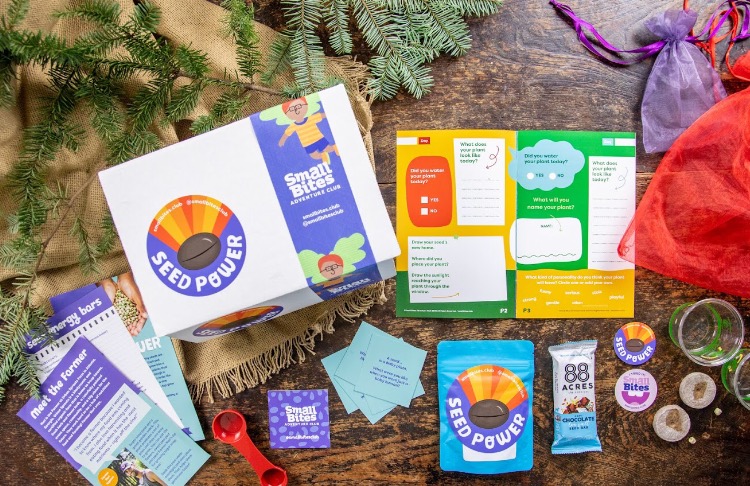
About the Daymaker Farm-to-Home Explorer Kits
Small Bites’ new Farm-to-Home kits will “help kids follow this magical journey from seed to plate,” Erin said. For the first six months of 2021, the kids will receive a monthly kit with a theme that contains: a recipe, an activity booklet, a ‘Meet the Farmer and Veggie/Fruit Card,’ and extras like family conversation cards, a snack bar, stickers, magnets, and videos. The activities within these kits focus on issues at the root of food: community, diversity, health & nature.
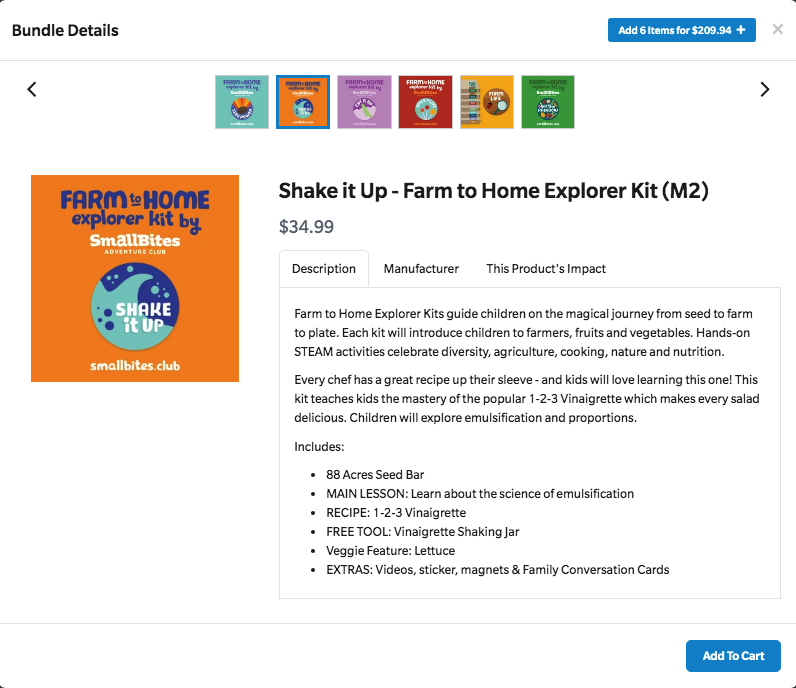
One component of these kits is a Meet The Farmer card (see below). This card tells the story of a farmer, where they are and what their life is like. “Most kids we talk to think food comes from the grocery store or Mom’s car,” said Erin. “We feel that it’s a very important part of a child’s education that food comes from farmers, and farms and the soil.”
Importantly, Small Bites recognizes the structural problems of a lack of representation in the farming community and in agricultural careers: they feature farmers of color on many of the Meet Your Farmer cards, and they purchase over 50% of the food in the kits from farmers of color. “I love the way that Small Bites elevates the voices of brown farmers, black farmers and women farmers,” said Wande Okunoren-Meadows from The Hand, Heart & Soul Project, a Daymaker nonprofit that also works with Small Bites in Atlanta.
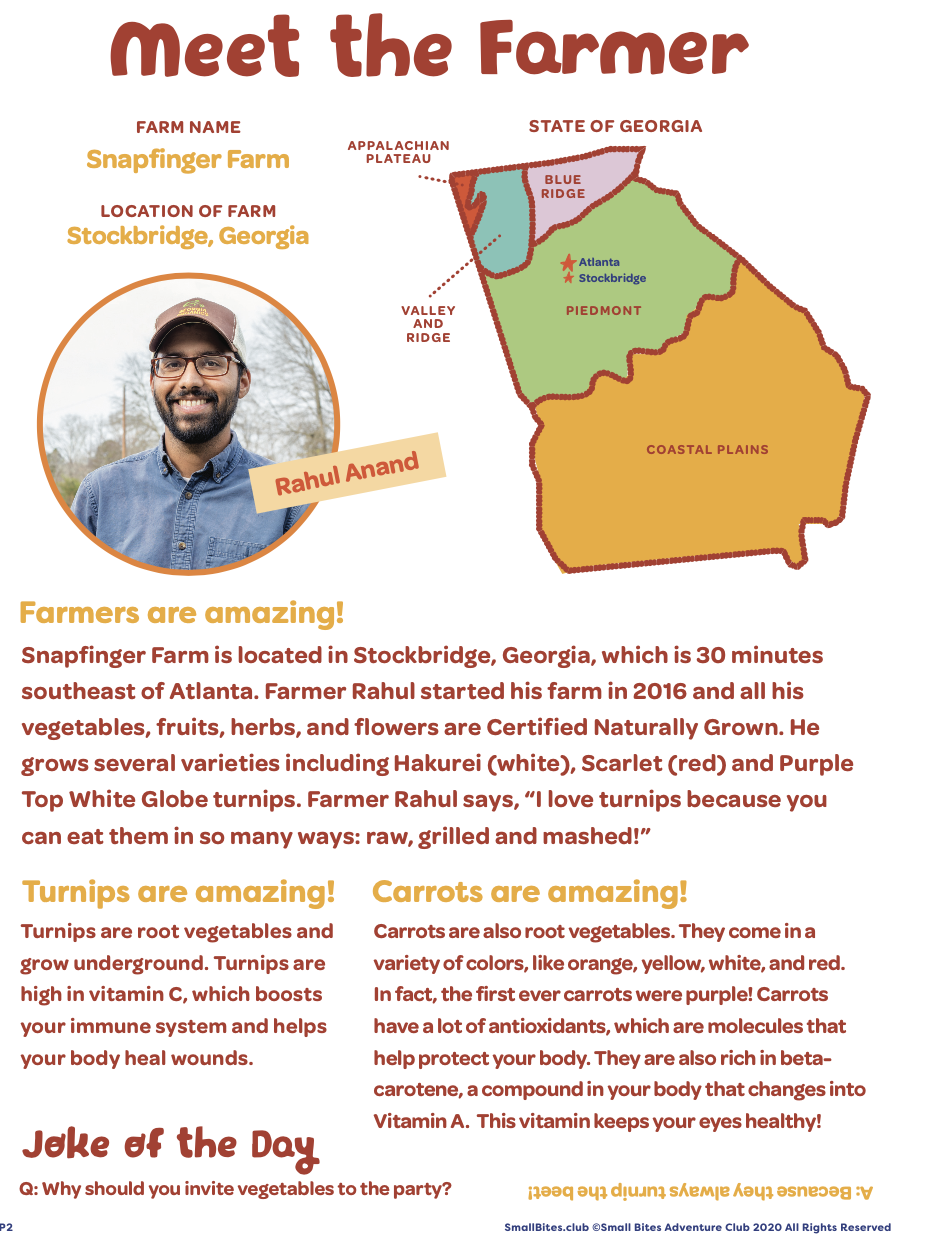
Small Bites has been sending kids from The Hand, Heart & Soul Project their Taste Test Boxes for classrooms during the pandemic. “Small Bites helps kids appreciate where their food comes from. So often kids grow up to only have appreciation for their Nike shoes, but these kits help kids have appreciation for the soil and where their food comes from. It really engages families and kids on a different level.”
The US food system marginalizes and negatively impacts those growing up in poverty. “People eat what they have access to” as Laura Phillips, from I Grow Chicago, a Daymaker nonprofit partner said. More than 23.5 million Americans, including 6.5 million children live in low-income urban and rural neighborhoods that are more than one mile from a supermarket with fresh produce. And the pandemic has shown the ways higher rates of infection from COVID-19 within black and brown communities in the United States stems from structural inequality within our neighborhoods and our food system.
Laura believes that these Farm-to-Home kits will be powerful for the kids that she works with everyday: “Kids want to play a part in the creation process. Having these kits will give kids agency in the creation process of the food that they are making. That will change a lot.”
Looking ahead
Just as Small Bites is fostering deeper relationships between kids, seeds, farmers and the earth, Daymaker hopes to foster connections between those giving and those receiving. If you donate a Farm-to-Home kit to a special kid on Daymaker this holiday season, you’ll get an update on how the Spring is going for that child during 2021, and you’ll have an opportunity to help the same child again during their back-to-school campaign. Daymaker is so excited to launch these kits as a way to help generate compassionate connections — connections between you, the children you’re supporting, and the seeds of life that can help lead to a healthy and flourishing future.
“You can’t educate to the head unless the body, the soul & the stomach are also taken care of”
Wande Okunoren-Meadows, Hand, Heart and Soul Project

